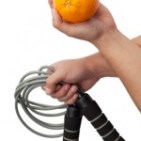The most frequent reason I hear people give for why they don’t exercise is that they “don’t have time.” While there are the rare days when you might truly be pressed for time because of travel or flight schedules, I’ll tell you why even on your busiest days – you don’t have time to not exercise.
The reality is that it is a matter of priorities and planning whether or not we have time built in or allotted for working out. The number one thing you can do to make sure you have time to exercise is to build it in your schedule. There is no absolute best time of day to work out; the best time is what works for you. If you’re no currentlyt in the habit of regularly exercising (and you should be), the first thing you need to do is make it a regular part of your lifestyle.
Plan some time in your schedule every day for exercise. It really doesn’t matter whether it is first thing in the morning or later in the day. You may have to experiment with a few different times of day before you find what works best for you. I prefer to exercise right after I come home from work. By that time, I’m ready for a round of P90X or a good run to wring out the tensions of the day, give my muscles a chance to move, stretch and be pushed, – and sweat out some toxins. The most important thing is to make it part of your daily schedule – a part of your lifestyle.
You do this by doing it regularly – every day.
Putting it on your schedule you m akes it a priority – makes it important enough that you have set time aside for it. Don’t let other things crowd it out – it’s as important (maybe even more important) than the other things you do. By placing it on your schedule, you won’t be faced with having to make a decision about whether or not you “have time” to work out.
akes it a priority – makes it important enough that you have set time aside for it. Don’t let other things crowd it out – it’s as important (maybe even more important) than the other things you do. By placing it on your schedule, you won’t be faced with having to make a decision about whether or not you “have time” to work out.
Don’t’ stress too much if you have to miss a day once in a while because of illness or the occasional travel day. But you will find that if you make it a part of your regular schedule, you won’t want to miss it, your day will just go better when you get your exercise in, and your day will feel “off” if miss it.
This isn’t a bad thing; exercise should be something that you look forward to. If you hate what you do for your workout – try something else! There are so many options for staying fit and giving your body the activity it needs to stay healthy – more on that in another post.
Once you make your workout a part of your lifestyle – not only will you find that you do have time for it (even on your busy days) but you’ll also experience a few distinct benefits that come along with daily exercise – including an increased energy level.
More on that in my next post – You don’t have time to skip your workout Part 2; find out about the three distinct benefits you get on the same day that you do your exercise.
Questions, comments, or want to find out more?
Leave me a comment below – I’d love to hear from you!







